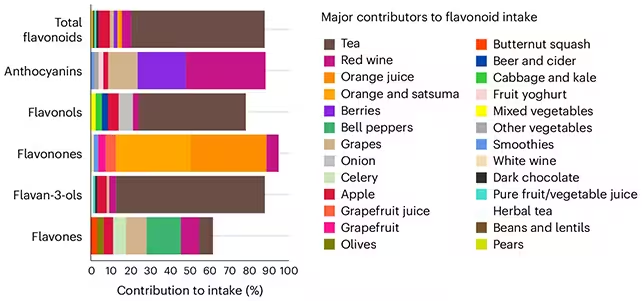4 Minutes
The Power of Flavonoids: Natural Compounds for Long-Term Health
Flavonoids, a wide family of plant-derived compounds present in foods such as teas, berries, apples, and dark chocolate, are increasingly recognized for their profound potential in promoting better health and longevity. New global research highlights that not just the quantity, but the diversity of flavonoid sources in one’s daily nutrition can significantly lower the risk of chronic diseases and even reduce all-cause mortality.
Understanding Flavonoids: The Science Behind the Health Benefits
Flavonoids are a group of bioactive phytonutrients, or plant chemicals, with potent antioxidant and anti-inflammatory properties. Numerous scientific studies have previously associated flavonoids with lower incidences of heart disease, type 2 diabetes, neurodegenerative disorders such as Parkinson’s disease, and age-related vision loss. These compounds are abundant in black and green tea, grapes, apples, berries, red wine, oranges, and even dark chocolate, making them easily accessible through a varied plant-based diet.
Large-Scale Study Reveals Impact of Flavonoid Diversity
In one of the most comprehensive studies to date, an international research team analyzed the dietary habits of 124,805 adults aged 40 and over in the United Kingdom, monitoring their health outcomes over several years. The researchers found compelling correlations between greater diversity in flavonoid-rich food consumption and reduced risks of several major health conditions.
As Dr. Aedín Cassidy, a nutritional scientist at Queen's University Belfast, emphasized, “We have long known that higher intakes of flavonoids can lower the risk of heart disease, diabetes, and neurological conditions. This research demonstrates that consuming a broader variety, rather than relying on a single source, may offer even greater protective effects.”

Key Findings from Dietary and Health Data
Tea—particularly black and green varieties—stood out as the primary source of flavonoids for two-thirds of study participants. However, those who incorporated a wider range of flavonoid-rich foods, such as apples, grapes, berries, citrus fruits, red wine, and dark chocolate, achieved the greatest reduction in disease risk.
Statistical analysis revealed that individuals consuming about 500 milligrams of flavonoids daily—the equivalent of two cups of tea—had a 16% lower risk of overall mortality, and about a 10% reduced risk of cardiovascular disease, type 2 diabetes, and respiratory illness, according to Dr. Benjamin Parmenter of Edith Cowan University, Australia. Importantly, those with the most varied intake experienced even greater reductions, irrespective of the total flavonoid amount consumed.
Expert Recommendations: How to Maximize Flavonoid Benefits
The study’s results underscore the value of regularly consuming a vivid, diverse spectrum of fruits and vegetables, focusing on variety as much as quantity. Participants in the highest fifth for flavonoid diversity saw a 6–20% lower risk of major conditions like type 2 diabetes, cancer, and neurodegenerative diseases compared to those with the least diverse diets.
Nutrition expert Tilman Kuhn from the Medical University of Vienna recommends, “Eating a rainbow of fruits and vegetables—especially those rich in flavonoids—increases the chances of meeting your micronutrient needs and sustaining a healthier lifestyle.” For those aiming to optimize their health, the data suggest incorporating a daily mix of up to 19 different flavonoid-containing foods, as practiced by top study performers.
Conclusion
This landmark research provides robust evidence that a diverse intake of flavonoid-rich foods is associated with marked reductions in chronic disease risk and improvements in overall survival. By embracing a varied, colorful diet filled with teas, fruits, berries, and select treats like dark chocolate, individuals may unlock significant protective health benefits. As ongoing research delves deeper into the mechanisms involved, the message for improving global public health is clear: diversity matters, especially on your plate.
Source: doi


Leave a Comment